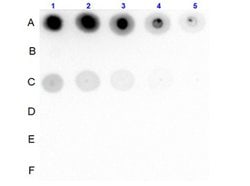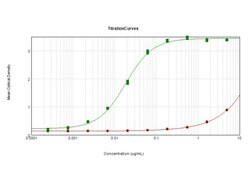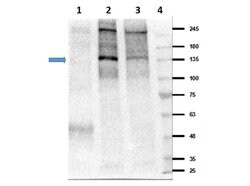Learn More
Phospho-Insulin Receptor (Tyr1361) Polyclonal Antibody, Rockland™


Rabbit Polyclonal Antibody
$174.73 - $636.24
Specifications
| Antigen | Phospho-Insulin Receptor (Tyr1361) |
|---|---|
| Concentration | 1 mg/mL |
| Applications | Dot Blot, ELISA, Immunofluorescence, Immunohistochemistry, Western Blot |
| Classification | Polyclonal |
| Conjugate | Unconjugated |
| Catalog Number | Mfr. No. | Quantity | Price | Quantity & Availability | |||||
|---|---|---|---|---|---|---|---|---|---|
| Catalog Number | Mfr. No. | Quantity | Price | Quantity & Availability | |||||
50-199-2350
 
|
Rockland Immunochemicals
600401MR0 |
100 μg |
Each for $636.24
|
|
|||||
50-199-2351
 
|
Rockland Immunochemicals
600401MR0S |
25 μL |
Each for $174.73
|
|
|||||
Description
Store vial at -20°C prior to opening. Aliquot contents and freeze at -20°C or below for extended storage. Avoid cycles of freezing and thawing. Centrifuge product if not completely clear after standing at room temperature. This product is stable for several weeks at 4°C as an undiluted liquid. Dilute only prior to immediate use. This affinity purified antibody is directed against human Insulin Receptor. This phospho specific polyclonal antibody is specific for pY1361 human Insulin Receptor. Reactivity with non-phosphorylated Y1361 is minimal. A BLAST analysis was used to suggest cross-reactivity with the antigen based on 100% homology with the immunizing sequence to human, rat, mouse, and xenopus laevis.
Biological actions of insulin and IGF-1 are mediated by their respective cell surface receptor tyrosine kinases that regulate multiple signaling pathways through activation of a series of phosphorylation cascades. The insulin receptor. Insulin/IGF-1 binding to the extracellular domain leads to autophosphorylation of downstream target proteins. These two receptors differ in sequence in regions that confer specificity for the designated ligand as well as in certain intracellular signaling domains, resulting in significant differences in the functional consequences of activation of each receptor. Defects in IR are the cause of various insulin resistance syndromes and IGF-1R defects may cause some forms of growth retardation. Both these signaling cascades are also important for the development of cancer.Specifications
| Phospho-Insulin Receptor (Tyr1361) | |
| Dot Blot, ELISA, Immunofluorescence, Immunohistochemistry, Western Blot | |
| Unconjugated | |
| Rabbit | |
| Human | |
| P06213 | |
| 3643 | |
| Primary | |
| Antibody |
| 1 mg/mL | |
| Polyclonal | |
| Liquid | |
| RUO | |
| 0.02M potassium phosphate with 0.15M NaCl and 0.01% sodium azide; pH 7.2 | |
| 4932439J01Rik; CD220; CD220 beta; CD221; D630014A15Rik; HHF5; IGF-I receptor; Insr; Insulin receptor; insulin receptor preproprotein; Insulin receptor subunit alpha; Insulin receptor subunit beta; IR; IR beta; IR-A; IR-B | |
| INSR | |
| -20°C, Avoid Freeze/Thaw Cycles | |
| INSR |
The Fisher Scientific Encompass Program offers items which are not part of our distribution portfolio. These products typically do not have pictures or detailed descriptions. However, we are committed to improving your shopping experience. Please use the form below to provide feedback related to the content on this product.


